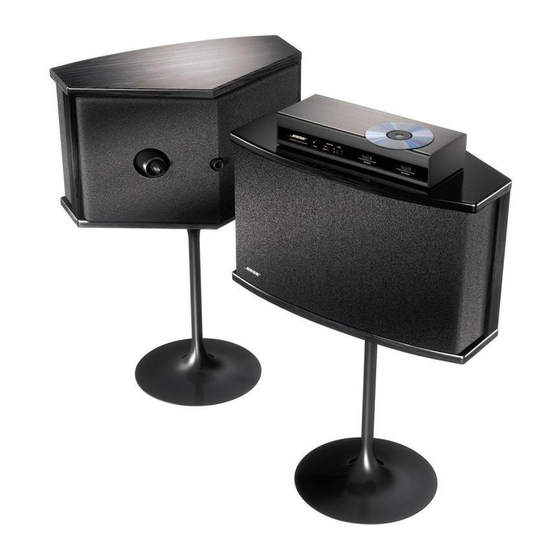Bose 901 Owner's Manual - Page 9
Browse online or download pdf Owner's Manual for Speaker System Bose 901. Bose 901 12 pages. Vi direct/reflecting speaker system
Also for Bose 901: Owner's Manual (41 pages), Owner's Manual (23 pages), Assembly And Mounting Instructions (1 pages), Installating And Operation Manual (15 pages), Owner's Manual (20 pages)

Listening to your 901
Adjusting the sound quality
Figure 6
Powered (left) speaker
control panel
®
®
®
901
DIRECT REFLECTING
POWERED SPEAKER SYSTEM
MAY BE COVERED BY PAT. RIGHTS ISSUED AND PENDING
INCLUDING U.S. PAT.3,582,533 4,061,890 4,146,745 4,158,756
4,739,514 AND RE31679. PATENTED IN CANADA 1974, 1980
© 1994 BOSE CORPORATION
SERIAL NUMBER
D.O.M.
BOSE CORPORATION, FRAMINGHAM, MA 01701-9168
MADE IN U.S.A.
CAUTION
RISK OF ELECTRICAL SHOCK
DO NOT OPEN
AVIS
RISQUE DE CHOC ÉLECTRIQUE
NE PAS OUVRIR
NORM
TREBLE
–
+
NORM
BASS
–
+
INPUT
FROM
LIFESTYLE® MUSIC
CENTER
POWER
OUTPUT
ON
OFF
TO
ACCESSORY
SPEAKER
AM264271_00_V.pdf
Operating Your 901
®
powered speaker system
The 901 powered speaker system is intended to be used as a ZONE 2 speaker system. A
ZONE 2 remote control is recommended. Please see your LIFESTYLE
guide for complete instructions or contact Bose
address and phone number list included with your system.
In most situations, placing your speakers according to the guidelines given in "Placing the
speakers" on page 5, will result in excellent sound quality.
You do not need to adjust tone settings for different volume settings. Bose patented signal
processing technology provides a natural tonal balance over the full range of volume settings.
If you wish to fine-tune the tonal balance further, use the TREBLE and BASS controls.
Treble and bass controls
The TREBLE and BASS controls are located on the powered speaker pedestal (Figure 6).
They allow you to adjust the treble (high frequencies) and bass (low frequencies). In the nor-
mal setting, the dot on each control is in the 12 o'clock position. You can also locate the nor-
mal setting by feeling when the control settles into the notch at this position. Turn the controls
clockwise to increase, or counterclockwise to decrease the amount of treble or bass.
Compensating for room acoustics
The acoustics (sound qualities) of your room can affect the overall sound quality of any
speaker system. In general, you can reduce many problems with acoustics by the cautious
use of the TREBLE and BASS controls.
Too much or too little treble
Rooms with few sound-absorbing furnishings, especially those with bare floors and walls,
may sound overly shrill or "bright". Turning down the treble control (toward –) decreases tre-
ble sound.
Rooms with a lot of sound-absorbing furnishings, such as upholstered furniture, wall-to-wall
carpet, or heavy drapes, may reduce the treble sound of your system. Moving speakers far-
ther away from soft furnishings increases treble. You can increase treble sound by slightly
turning up the treble control (toward +).
Too much or too little bass
You can decrease bass sound by turning down the bass control (toward –). To increase bass,
turn up the bass control (toward +).
Speaker placement affects the amount of bass you hear. Placing the speakers closer to the
corners of the room will increase bass. Keep the speakers within 2 to 4 feet (60–120 cm) of
the side walls (see "Placing the speakers" on page 5). If you want to increase bass further,
starting at 16 inches from the back wall, move the tips of the V-shaped rear panels slightly
closer to the wall (but no closer than 8 inches).
November 19, 2001
®
Powered Speaker System
®
system's owner's
®
customer service for assistance. See the
9
